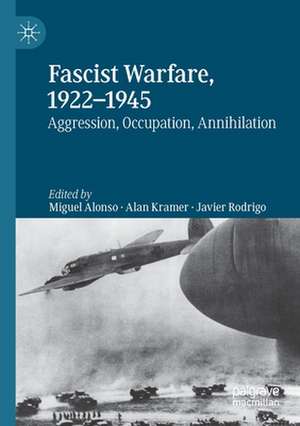Fascist Warfare, 1922–1945: Aggression, Occupation, Annihilation
Editat de Miguel Alonso, Alan Kramer, Javier Rodrigoen Limba Engleză Paperback – 30 dec 2020
| Toate formatele și edițiile | Preț | Express |
|---|---|---|
| Paperback (1) | 782.42 lei 43-57 zile | |
| Springer International Publishing – 30 dec 2020 | 782.42 lei 43-57 zile | |
| Hardback (1) | 786.18 lei 43-57 zile | |
| Springer International Publishing – 8 dec 2019 | 786.18 lei 43-57 zile |
Preț: 782.42 lei
Preț vechi: 954.17 lei
-18% Nou
Puncte Express: 1174
Preț estimativ în valută:
149.71€ • 156.73$ • 123.88£
149.71€ • 156.73$ • 123.88£
Carte tipărită la comandă
Livrare economică 07-21 aprilie
Preluare comenzi: 021 569.72.76
Specificații
ISBN-13: 9783030276508
ISBN-10: 3030276503
Pagini: 336
Ilustrații: VII, 336 p. 2 illus.
Dimensiuni: 148 x 210 mm
Greutate: 0.45 kg
Ediția:1st ed. 2019
Editura: Springer International Publishing
Colecția Palgrave Macmillan
Locul publicării:Cham, Switzerland
ISBN-10: 3030276503
Pagini: 336
Ilustrații: VII, 336 p. 2 illus.
Dimensiuni: 148 x 210 mm
Greutate: 0.45 kg
Ediția:1st ed. 2019
Editura: Springer International Publishing
Colecția Palgrave Macmillan
Locul publicării:Cham, Switzerland
Cuprins
1. Introduction
2. From Great War to Fascist Warfare
3. National Socialist Assessments of Fascist Warfare (1935–1939)
4. Civil War, Total War, Fascist War. Rebel Violence and Occupation Policies in the Spanish Civil War (1936–1939)
5. Fascist Civil Warfare: Mussolini’s Wars in Spain and Italy, 1936-1945
6. Cultures of Total Annihilation? The German, Italian, and Japanese Armies during the Second World War
7. Technology and Terror in Fascist Italy’s Counterinsurgency Operations: Ethiopia and Yugoslavia, 1936–43
8. The Impact of the ‘China experience’ on Japanese Warfare in Malaya and Singapore
9. Fascist Warfare and the Axis Alliance: From Blitzkrieg to Total War
10. The German War in the East: The Radical Variant of Fascist War
11. The Evolution of Ustasha Mass Violence: Nation-Statism, Paramilitarism, Structure, and Agency in the Independent State of Croatia, 1941
12. From the Milizia Fascista Albanese to the 21st SS Skanderbeg-Division: Between Imposing Fascist Ideology and Adapting Local Warfare
Notă biografică
Miguel Alonso is a researcher at the Universitat Autònoma de Barcelona, Spain.
Alan Kramer is Emeritus Fellow and Professor of History, Trinity College Dublin, Ireland.
Javier Rodrigo is ICREA-Acadèmia Reseach Fellow and Associate Professor at the Universitat Autònoma de Barcelona, Spain.
Textul de pe ultima copertă
This groundbreaking book explores the interpretative potential and analytical capacity of the concept ‘fascist warfare’. Was there a specific type of war waged by fascist states? The concept encompasses not only the practice of violence at the front, but also war culture, the relationship between war and the fascist project, and the construction of the national community. Starting with the legacy of the First World War and using a transnational approach, this collection presents case studies of fascist regimes at war, spanning Nazi Germany, Fascist Italy, Francoist Spain, Croatia, and Imperial Japan. Themes include the idea of rapid warfare as a symbol of fascism, total war, the role of modern technology, the transfer of war cultures between regimes, anti-partisan warfare as a key feature, and the contingent nature and limits of fascist warfare.
Caracteristici
Examines the extent to which fascist regimes practised a similar style of war
Presents case studies of various fascist regimes at war, including Nazi Germany, Fascist Italy, Francoist Spain, Croatia, and Imperial Japan
Appeals to scholars and readers interested in twentieth-century history, fascism, war and society, and World War II
Presents case studies of various fascist regimes at war, including Nazi Germany, Fascist Italy, Francoist Spain, Croatia, and Imperial Japan
Appeals to scholars and readers interested in twentieth-century history, fascism, war and society, and World War II
